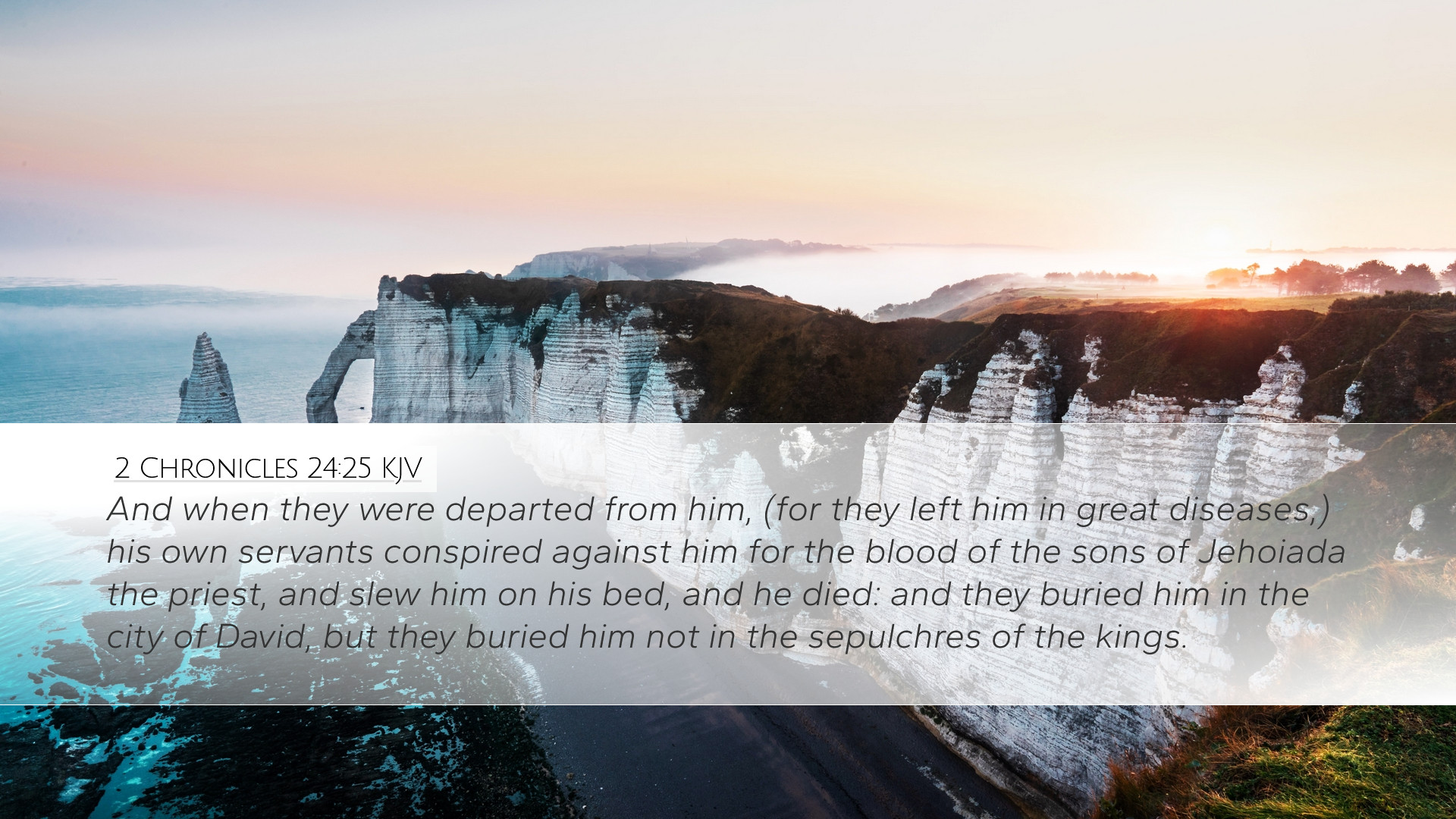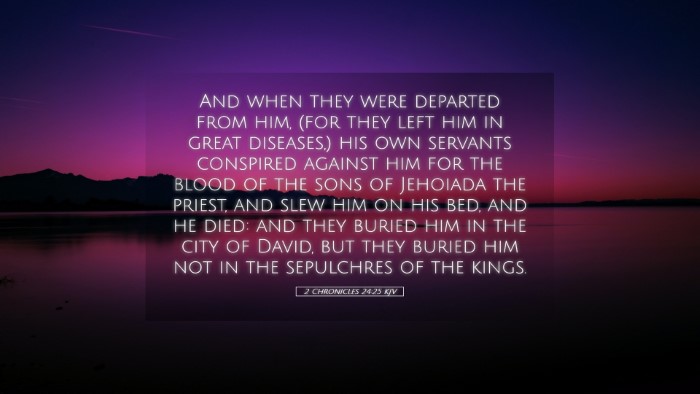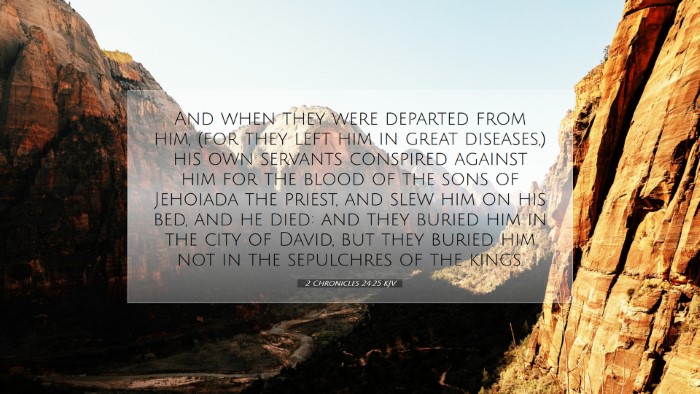Commentary on 2 Chronicles 24:25
Verse: 2 Chronicles 24:25
“And when they were departed from him, for they left him in great diseases, his own servants conspired against him for the blood of the children of the priests, and slew him on his bed: and he died: and they buried him in the city of David, but they buried him not in the sepulchres of the kings.”
Introduction
The narrative found in 2 Chronicles 24:25 serves as a sobering conclusion to the life of King Joash of Judah, a ruler who experienced significant highs and lows. This commentary will provide an exploration of this verse through the lenses of esteemed biblical scholars such as Matthew Henry, Albert Barnes, and Adam Clarke. We will discuss its theological implications, historical context, and practical applications for today’s readers.
Historical Context
Joash began his reign as a child under the protection and guidance of the high priest Jehoiada, who fostered a period of religious reform and restoration of the Temple. However, following Jehoiada’s death, Joash strayed from the faith, embraced idolatry, and committed severe injustices, including the murder of Zechariah, Jehoiada's son. This tragic verse illustrates the consequences of Joash's forsaking of divine principles and the ensuing chaos of his reign.
Thematic Insights
Downfall of Joash
Joash's rapid decline post-Jehoiada's era is crucial to understanding his tragic end. Matthew Henry notes that Joash, having turned away from God, faced the natural consequences of his actions: “He who departs from God is in a great way of ruin.” His spiritual decline led to betrayal, conspiracy, and ultimately his assassination. This serves as a warning about the dangers of abandoning divine instruction and governance.
The Role of Conspiracy
The text explicitly mentions a conspiracy among his servants, emphasizing the themes of betrayal and the severe consequences of poor leadership. Albert Barnes remarks that “the same hands which he had nourished and honored turned against him.” This aspect reflects the moral fabric of leadership—loyalty can turn to treachery when the leader strays from righteousness. For contemporary readers, especially pastors and leaders, this serves as a reminder of the importance of maintaining integrity and accountability.
The King’s Burial
The decision not to bury Joash in the sepulchers of the kings is particularly telling. Adam Clarke observed that this omission reflected the dishonor associated with his reign. Such a burial signifies a lasting legacy—not merely one of royalty, but one tainted with bloodshed and spiritual corruption. For theologians, this contrasts a life that honors God versus one marked by transgression and betrayal. The implications evoke solemn introspection concerning how one's lifestyle aligns with divine expectations.
Theological Reflections
The Judgment of God
The demise of Joash demonstrates God’s judgment on a leader who fails to uphold His statutes. Matthew Henry writes, “God’s judgments are sometimes executed by means very contrary to the designs of the parties concerned.” Joash's end reflects the chase that divine justice can take, often through unexpected and painful means. The biblical truth is that while God's love is steadfast, His righteousness will not overlook persistent disobedience.
Leadership and Accountability
The repercussions from Joash’s downfall raise pertinent issues concerning leadership and accountability. No leader operates in a vacuum. As Albert Barnes notes, negligent leadership can lead to catastrophic consequences—for oneself and those under their care. Modern-day leaders within the church must be vigilant in fostering environments where accountability to God's Word is paramount. The threats to spiritual purity can often lurk behind successful appearances, compounding the risk of a spiritual fall.
The Importance of Legacy
The manner of Joash’s death and burial invites reflection on the legacy one leaves behind. Adams Clarke’s commentary reinforces the need to evaluate our lives in light of eternity: “What a man is in life, that he will be in death.” For students and scholars alike, analyzing Joash’s story emphasizes the weight of one’s choices and their mark on future generations. The question posed is not merely one of success, but of faithfulness—a key marker of genuine leadership.
Practical Applications
- Guardianship of Spiritual Fidelity: Leaders must maintain a personal commitment to their faith and teachings, remaining vigilant against moral and spiritual decay.
- Understanding Vulnerability to Influence: Recognizing how quickly loyalty can shift is vital; continuous commitment to God’s ways strengthens unity and purpose among leaders and their followers.
- Cultivating a Legacy of Honor: Individuals should be intentional in their conduct to ensure the legacy they leave is one that honors God and uplifts those they lead.
- Accountability as a Community: Establishing a culture of accountability within church leadership fosters an environment where individuals are encouraged to uphold spiritual integrity collectively.
Conclusion
In reflecting upon 2 Chronicles 24:25, we observe a somber lesson on the consequences of straying from God’s paths and the importance of accountability in leadership. Through the comprehensive insights provided by Matthew Henry, Albert Barnes, and Adam Clarke, we are reminded that the lessons from ancient texts are profoundly relevant today. For pastors, students, and scholars alike, the story of Joash is a call to vigilance, reflection, and a recommitment to living lives that are aligned with the principles of God, ensuring that our leadership honors Him while positively influencing our communities.


